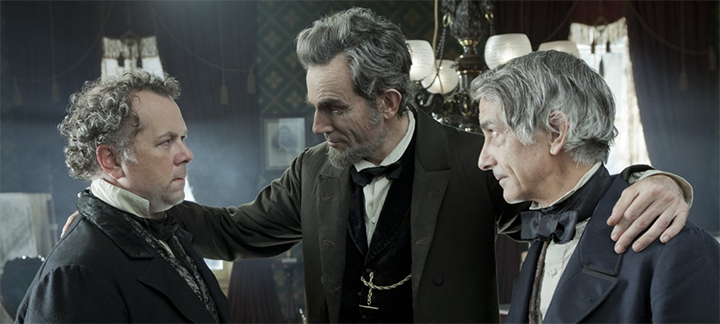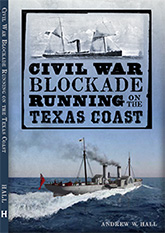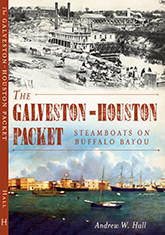
Lincoln (Daniel Day Lewis) confers with (l.) U.S. Representative James Ashley (David Costabile) and Secretary of State William Seward (David Strathairn) on strategy for passing the 13th Amendment.

I went to see Lincoln again on Thursday afternoon. It’s been playing here almost a month, but the matinee showing I attended Thursday was about as full as the first time I went, soon after it opened — only a few, scattered empty seats. It seems to be doing well, and it deserves to. The first time around I missed the opening scene, with the soldiers reciting the Gettysburg Address, that so many reviewers found clumsy and heavy-handed, and was ready to be turned off by it. In fact, I think it “works,” at least from the perspective of the average, non-history-nerd movie-goer, because it captures the moral core of what the Civil War had become for many in the North by the last few months of the war, and effectively frames the main narrative of Spielberg’s film.
One reason I wanted to go back was because I wanted to revisit some of the dialogue that seemed particularly sharp. One of these scenes appears relatively early in the movie, when Lincoln explains to his cabinet why he’s chosen to fight for the 13th Amendment now, during a lame-duck session of the House of Representatives whose members had previously voted it down, instead of waiting until the fall and beginning of a new Congress, when an expanded Republican majority in the House should be able to pass it easily. The time is now, Lincoln argues, because the war will soon be over, and with it his expanded authority as commander-in-chief. In this discussion, Lincoln acknowledges that Emancipation Proclamation was a wartime measure — a “military exigent,” his Attorney General calls it, and “slippery” according to Lincoln himself — that would be uncertain to survive review by the civilian courts once the wartime necessity of it had passed. He also acknowledges that as a result of the war — a far more desperate and prolonged conflict than any previous since the adoption of the U.S. Constitution in 1789 — no one really knew what the limits of executive power were in wartime, and (as with the legality of secession itself) those things were even then being sorted out. That’s why, Lincoln felt, the Thirteenth Amendment had to be passed and sent to the states for ratification immediately, to make permanent the provisions the Emancipation Proclamation had made temporarily, by force of arms.
Tony Kushner’s script brings all this out in that scene with Lincoln and his cabinet, where in a bit of expository dialogue, the 16th President lays out the legal and political terrain of emancipation. The discussion here is between Lincoln and John Palmer Usher, his Secretary of the Interior, and James Speed, his new Attorney General.

JOHN USHER
Then why, if I may ask are we not concentrating the nation’s attention on Wilmington? Why, instead, are we reading in the Herald that the anti-slavery amendment is being precipitated onto the House floor for debate – because your eagerness, in what seems an unwarranted intrusion of the Executive into Legislative prerogatives, is compelling it to it’s… to what’s likely to be its premature demise? You signed the Emancipation Proclamation, you’ve done all that can be expected –
JAMES SPEED
The Emancipation Proclamation’s merely a war measure. After the war the courts’ll make a meal of it.
JOHN USHER
When Edward Bates was Attorney General, he felt confident in it enough to allow you to sign. . .
JAMES SPEED
Different lawyers, different opinions. It frees slaves as a military exigent, not in any other –
LINCOLN
I don’t recall Bates being any too certain about the legality of my Proclamation, just it wasn’t downright criminal. Somewhere’s in between.
Back when I rode the legal circuit in Illinois I defended a woman from Metamora named Melissa Goings, 77 years old, they said she murdered her husband; he was 83. He was choking her; and, uh, she grabbed ahold of a stick of fire-wood and fractured his skull, ‘n he died. In his will he wrote “I expect she has killed me. If I get over it, I will have revenge.”
No one was keen to see her convicted, he was that kind of husband. I asked the prosecuting attorney if I might have a short conference with my client. And she and I went into a room in the courthouse, but I alone emerged. The window in the room was found to be wide open. It was believed the old lady may have climbed out of it. I told the bailiff right before I left her in the room she asked me where she could get a good drink of water, and I told her Tennessee.
Mrs. Goings was seen no more in Metamora. Enough justice had been done; they even forgave the bondsman her bail.
JOHN USHER
I’m afraid I don’t –
LINCOLN
I decided that the Constitution gives me war powers, but no one knows just exactly what those powers are. Some say they don’t exist. I don’t know. I decided I needed them to exist to uphold my oath to protect the Constitution, which I decided meant that I could take the rebels’ slaves from ‘em as property confiscated in war. That might recommend to suspicion that I agree with the rebs that their slaves are property in the first place. Of course I don’t, never have, I’m glad to see any man free, and if calling a man property, or war contraband, does the trick… Why I caught at the opportunity.
Now here’s where it gets truly slippery. I use the law allowing for the seizure of property in a war knowing it applies only to the property of governments and citizens of belligerent nations. But the South ain’t a nation, that’s why I can’t negotiate with ’em. So if in fact the Negroes are property according to law, have I the right to take the rebels’ property from ‘em, if I insist they’re rebels only, and not citizens of a belligerent country?
And slipperier still: I maintain it ain’t our actual Southern states in rebellion, but only the rebels living in those states, the laws of which states remain in force. The laws of which states remain in force. That means, that since it’s states’ laws that determine whether Negroes can be sold as slaves, as property – the Federal government doesn’t have a say in that, least not yet, then Negroes in those states are slaves, hence property, hence my war powers allow me to confiscate ‘em as such. So I confiscated ‘em.
But if I’m a respecter of states’ laws, how then can I legally free ‘em with my Proclamation, as I done, unless I’m cancelling states’ laws? I felt the war demanded it; my oath demanded it; I felt right with myself; and I hoped it was legal to do it, I’m hoping still.
Two years ago I proclaimed these people emancipated – “then, thenceforward and forever free.” But let’s say the courts decide I had no authority to do it. They might well decide that. Say there’s no amendment abolishing slavery. Say it’s after the war, and I can no longer use my war powers to just ignore the courts’ decisions, like I sometimes felt I had to do. Might those people I freed be ordered back into slavery? That’s why I’d like to get the Thirteenth Amendment through the House, and on its way to ratification by the states, wrap the whole slavery thing up, forever and aye. As soon as I’m able. Now. End of this month. And I’d like you to stand behind me. Like my cabinet’s most always done.
As the preacher said, I could write shorter sermons but once I start I get too lazy to stop.
JOHN USHER
It seems to me, sir, you’re describing precisely the sort of dictator the Democrats have been howling about.
JAMES SPEED
Dictators aren’t susceptible to law.
JOHN USHER
Neither is he! He just said as much! Ignoring the courts? Twisting meanings? What reins him in from, from. . . .
LINCOLN
Well, the people do that, I suppose. I signed the Emancipation Proclamation a year and half before my second election. I felt I was within my power to do it; however I also felt that I might be wrong about that; I knew the people would tell me. I gave ‘em a year and half to think about it. And they reelected me.
And come February the first, I intend to sign the Thirteenth Amendment.

I wish Tony Kushner would spend some time writing K-12 lesson plans. Not many young people, it seems to me, have any concept of the complexity of this stuff, and it seems like it mostly doesn’t get covered very well. That’s all our loss.
__________


![]()

![]()






Totally agree. Well said. Kushner’s script is a penetrating analysis of a topic that is usually muddied beyond perception.
Andy–I just saw the movie today. This was one of my favorite scenes. I thought it picked up on a lot of political and legal intricacies surrounding the whole emancipation issue. I told my wife that this dialogue would possibly go over some viewer’s heads, as there is a lot to it, and a lot to unpack. I am glad you’ve put the script here for people to read and ponder. At some point I’ll post my thoughts on my blog, and be sure to link to this discussion here!
I haven’t seen the movie yet, but this scene seems to capture the essence of Lincoln’s presidency; he did what he thought was right for the nation without worrying too much what folks thought about him. We still hear echoes of it: those folks who agree with him call him our best president ever, and those who don’t call him a tyrant. But nobody argues that he wasn’t effective, or that he didn’t accomplish great things to move the nation in the direction he thought it needed to go.
It’s a degree of political courage we don’t see today. I count that a loss.
Thanks for a great site, Andy!
Andy,
Bummer really appreciates the publishing of Kushner’s script. The “old guy” misses a lot of the dialogue at films because of one glaring physical defect,among many, can’t hear worth a darn. This student needs to see a flick several times in order to put all the pieces together. Thanks for the post.
Bummer
Thanks for publishing this, Andy. I can read and re-read it, which is very helpful and allows me to ponder the words and concepts more closely. It may not be exactly what was said some 150 or so years ago, but it seems to me that it’s likely pretty close to how those in power were thinking. Nothing was as cut and dried as so many today want to make it out to be. That is something almost no one today takes into account, or, in many cases, wants to take into account.
I was thinking this morning that Lincoln’s dialogue here is very much like the table in his office around which the cabinet meets — cluttered and piled high with ideas. There’s a lot in there to unpack, that a casual, once-over glance would not reveal.
I loved that the famous ‘slavery map’ (show percentages of the population enslaved, county by county’ is on the wall of his office in some scenes.
That’s an accurate depiction:
Just finished von Drehle’s Rise to Greatness, which I recommend. He notes Lincoln made changes between the preliminary and final Proclamations, one of which was to remove the word “forever”. Because it was founded on his wartime powers, he couldn’t guarantee that the emancipated slaves would be forever free.